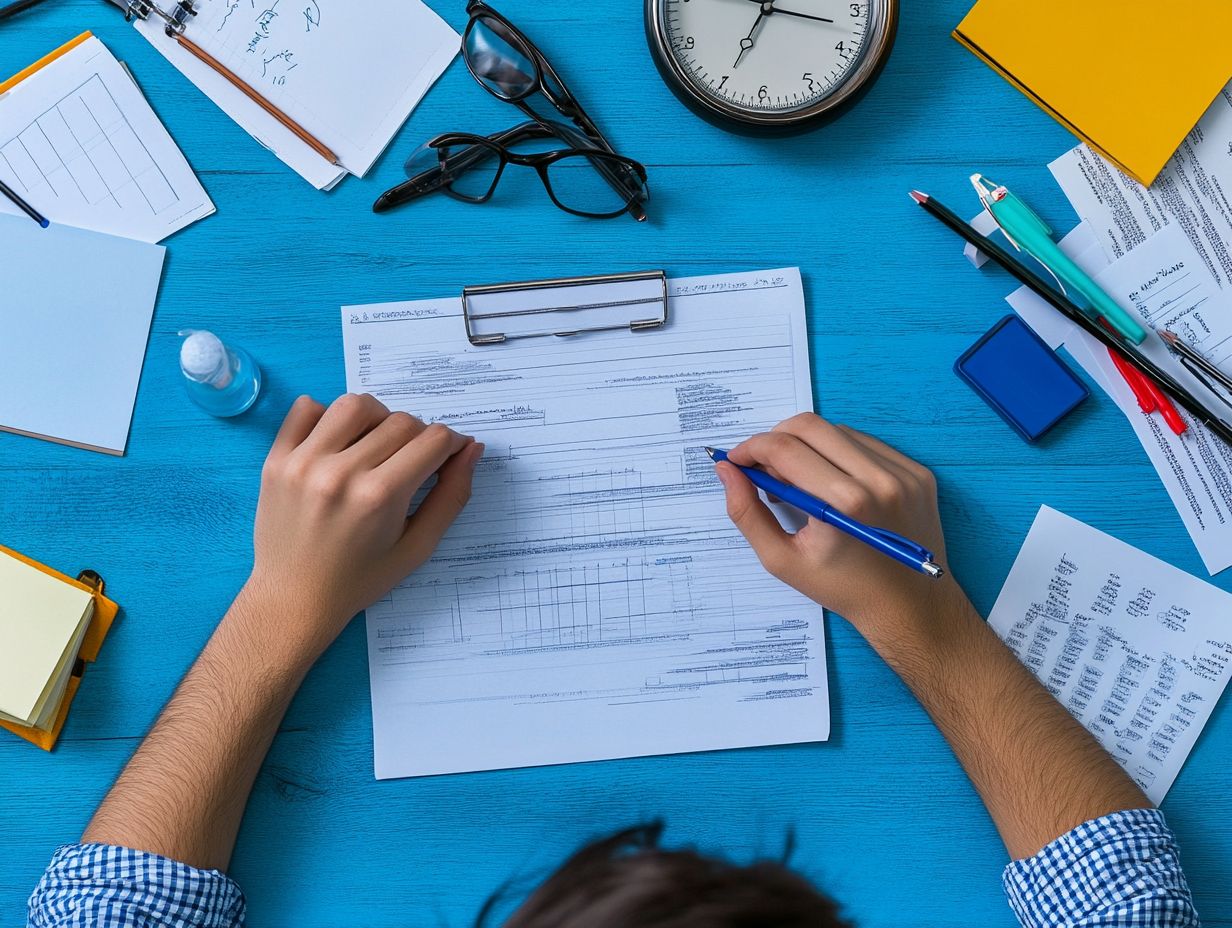understanding the role of practice exams
Practice exams are indispensable in the learning journey. They serve not merely as a method to assess knowledge but as powerful tools to enhance retention and deepen understanding.
This article delves into the importance of these assessments and offers a comparison between mock exams and real ones. It also provides strategies to seamlessly integrate them into your study routine.
Practice exams offer many benefits, such as honing your test-taking skills and pinpointing knowledge gaps. However, it s important to address potential drawbacks you should be mindful of.
By the end, you will have a thorough understanding of how to optimize your learning experience through the effective use of practice exams.
Contents
Key Takeaways:

- Practice exams are essential for effective learning, allowing students to apply knowledge in a test-like setting and identify areas for improvement.
- There are different types of practice exams, including mock exams and real exams, each with its own benefits and drawbacks.
- To use practice exams effectively, students should incorporate them into their study routines and utilize strategies such as analyzing mistakes and tracking progress.
The Importance of Practice Exams
Practice exams are essential to your academic success. They function not just as a preparatory tool but also as a way to ease test anxiety and boost memory retention.
By simulating real exam conditions, these tests provide you with firsthand experience of the exam format. This helps you pinpoint knowledge gaps and refine your test-taking skills in a supportive environment.
Engaging with practice exams promotes effective study habits and fuels your motivation and goal-setting. These elements are key for achieving stellar academic performance.
Whether you’re gearing up for standardized tests like the SAT or GRE, the impact of practice exams is incredible! They can truly transform your study routine.
Why Practice Exams are Essential for Learning
Understanding the importance of practice exams for your learning journey is about recognizing what is the role of practice tests in preparation and how they enhance your self-efficacy while reinforcing your study techniques.
These assessments do more than simply measure your knowledge; they offer critical feedback that can significantly boost your retention.
The testing effect shows that actively recalling information through practice tests encourages deeper cognitive processing, enriching your understanding.
When you engage in retrieval practice, which is the act of recalling information to strengthen your memory, you’re not just memorizing you re solidifying your grasp on the material. This makes it easier to access that information later on.
This method builds your confidence while allowing you to pinpoint areas for improvement. At the same time, you can celebrate your progress. Practice exams are invaluable tools in your learning arsenal.
Types of Practice Exams

You ll find a variety of practice exams at your disposal, including mock exams, exam simulations, and specially crafted practice questions tailored for standardized tests like the SAT and GRE.
Each type enhances your preparation, allowing you to approach your exam with confidence and clarity.
Mock Exams vs. Real Exams
Mock exams and real exams present a striking contrast in terms of conditions and preparation strategies. Mock exams act as a rehearsal for the actual test format.
These practice sessions provide you with an invaluable opportunity to get acquainted with the pacing and structure of standardized tests like the GRE or SAT.
While real exams carry the burden of definitive scores that impact admission decisions, mock exams offer you the freedom to experiment with various test-taking strategies without the stress of real-world consequences.
By analyzing your mock test results, you can identify specific areas for improvement and tailor your study plans effectively.
Both types of exams hold their importance, but mock exams are particularly advantageous for building your confidence and honing your performance in a low-pressure environment.
How to Use Practice Exams Effectively
Utilizing practice exams effectively demands a strategic approach that incorporates refined studying techniques, meticulous time management, and comprehensive preparation for exam day.
Start incorporating practice exams into your study routine today for a successful tomorrow!
Tips for Maximizing Learning and Retention

To truly maximize your learning and retention while using practice exams, embrace spaced retrieval techniques and sharpen your critical thinking skills. Additionally, craft effective test strategies that align with the exam environment.
Incorporating methods for actively remembering can significantly enhance your grasp of the material by encouraging you to retrieve information from memory instead of merely skimming through your notes.
Setting specific, achievable goals is important; it helps you maintain motivation and focus. This allows you to monitor your progress and stay engaged during your study sessions.
Combine these techniques with regular self-assessment. You can pinpoint areas that need improvement and cultivate a growth mindset. This approach will ultimately boost your performance and confidence when facing the actual exam.
Benefits of Taking Practice Exams
Taking practice exams provides you with a wealth of benefits. They help you develop crucial test-taking skills and significantly enhance your exam preparation while boosting your self-efficacy.
These elements come together to elevate your overall academic performance, setting you up for success.
Improving Test-Taking Skills
Improving your test-taking skills through practice exams for SAT preparation is essential for achieving exam readiness. These practice sessions not only familiarize you with the exam structure but also refine your strategies for managing time and interpreting questions accurately.
For instance, simulating a timed exam helps you learn to allocate your time wisely across different sections. This prevents those last-minute rushes that can lead to mistakes. Feedback mechanisms like instant scoring and detailed performance analytics provide valuable insights into areas that require more attention. This allows you to adopt a targeted approach to your studies.
By reviewing incorrect answers, you can identify reasoning errors. This paves the way for deeper learning and boosts your confidence for the actual exam day.
Identifying Knowledge Gaps

One of the key benefits of taking practice exams is the ability to identify knowledge gaps that might hinder your academic success. By using practice tests to build test-day confidence, analyzing your results helps pinpoint specific areas where your understanding or confidence is lacking. This is crucial for directing your study efforts.
Instead of aimlessly reviewing materials, hone in on these weaknesses for a more efficient learning experience. Fill these gaps well before the actual examination to build a stronger foundation and reduce anxiety.
Engaging in targeted revision and retrieval practices not only solidifies your knowledge but also enhances recall during the exam. This ultimately leads to better performance.
Potential Drawbacks of Practice Exams
While practice exams are helpful, it s crucial to recognize their limitations. You might find yourself becoming overly reliant on these tools, which can heighten your test anxiety and detract from developing effective studying strategies.
Balancing practice with diverse study methods will ensure you maximize your preparation while minimizing stress.
Avoiding Over-reliance on Practice Exams
To avoid becoming overly reliant on practice exams, strike a balance by incorporating a variety of effective study techniques that enhance your self-efficacy.
A well-rounded study plan includes a mix of methods such as actively remembering, summarization, and engaging in group discussions, all tailored to accommodate different learning styles.
By embracing these diverse techniques, you not only boost your retention but also build confidence as exam day approaches. Cultivating a healthy mindset toward testing is essential in reducing anxiety.
When you shift your focus from results to the learning process, transform assessments into valuable opportunities for growth. This perspective alleviates stress and fosters a more positive and effective preparation experience.
Start implementing these tips today to ace your exams!
Incorporating Practice Exams into Study Plans
Incorporating practice exams into your study plan requires a thoughtful strategy. These exams should fit into your routine and elevate your preparation for exam day.
Strategies for Incorporating Practice Exams into Study Routines
Effective strategies include creating a solid time management plan and using various study materials. Establish clear motivational goals to keep you focused.
To create a balanced study schedule, prioritize practice exams that cover different subjects and formats. This includes multiple-choice questions, essays, and problem-solving tasks.
This variety sharpens your skills and keeps study sessions engaging. Allocate specific time blocks for each exam, and remember to schedule breaks to recharge.
Break larger goals into smaller, manageable tasks. This approach helps you track progress and fosters responsibility, which leads to better performance.
Frequently Asked Questions
What is the purpose of practice exams?
Practice exams help you prepare for upcoming tests by simulating the actual experience. They allow you to identify areas of weakness for further study.
How can practice exams help improve my performance?
By taking practice exams, you become familiar with the format and question types, which can reduce anxiety and improve time management skills.
Are practice exams an accurate representation of the real exam?
Practice exams aim to mimic the actual exam, but they may not reflect the exact questions or difficulty. However, they still provide valuable preparation.
How often should I take practice exams?
Your frequency of practice exams depends on your study habits. Some find regular practice helpful, while others prefer to take exams closer to the test date.
Can I use practice exams for all subjects?
Practice exams cover many subjects, from high school to graduate levels. Check with your instructor or exam provider for availability.
Can practice exams replace studying?
No, practice exams should complement other study techniques. They help identify areas needing review but should not replace comprehensive studying.






